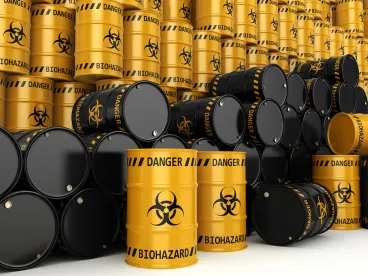In one action, EPA has solved the problem faced by thousands of companies as they prepare to comply with the Toxic Substances Control Act (TSCA) fees rule self-notification requirement. On March 25, 2020, EPA release a memorandum by the EPA Office of Enforcement and Compliance Assurance (OECA) assuring that EPA will not bring an enforcement action against any company that only manufactured a high-priority substance as an impurity or byproduct, or as a component of an imported article, that does not self-notify to EPA. This is good news that allows many – but not all – companies to avoid notifying EPA that they are liable for a portion of the TSCA fees for high-priority substance that they manufactured or imported.
Background
As explained in our previous alert, in 2018 EPA adopted a rule that allowed EPA to assess fees to manufacturers of chemicals subject to certain regulatory activities. 40 C.F.R. Part 700, Subpart C. One of those activities was EPA’s risk evaluations for high-priority substances under TSCA § 6(b). For the first 20 high-priority substances listed in December 2019, the fee amounted to $1,350,000 per substance. EPA would divide the fee for each substance among the companies notifying EPA that they had manufactured domestically or imported that substance during a previous period.
EPA announced a notification deadline of March 27, 2020 in a January Federal Register notice. That notice also announced that EPA has posted on its website preliminary lists of companies that may be manufacturers of the 20 substances.
The Problem
Crucially, that January notice also made clear, for the first time for many, that the 2018 fees rule did not include any of the usual TSCA exemptions for persons who manufacture a chemical as an impurity or byproduct, or import it as part of an article. These and other exemptions listed in 40 C.F.R. § 720.30(g) and (h) are included in most TSCA regulations, but EPA chose not to include them in the TSCA fees rule.
This meant that many companies that had not previously regarded themselves as manufacturers were subject to the TSCA fees rule, including its requirement to self-notify to EPA by March 27. Due to the nature of some of the 20 high-priority substances, this lack of exemptions had profound implications.
For example, the 20 substances included five phthalates and three flame retardants. These substances may be present in components of thousands or millions of articles that companies import. With no exemption for imported articles, any company that imported articles potentially containing a listed phthalate or flame retardant faced a dilemma. An importing company may not know whether a listed phthalate or flame retardant is even in the articles it imports, much less which one (or ones). EPA had not limited the reporting obligation to information “known to or reasonably ascertainable by” the importers, as is the case with rules under TSCA § 8(a). Importers thus had to decide how to report in the absence of knowledge or risk violating the TSCA fees rule.
Formaldehyde, another listed high-priority substance, posed a different problem. Formaldehyde is a byproduct of many chemical processes, including combustion. With no exemption for byproducts in the TSCA fees rule, every company in the United States that burns fuel was a manufacturer of formaldehyde as a byproduct, and thus was obligated to self-notify as such. The preliminary list of potential formaldehyde manufacturers included companies that only manufactured that chemical as a byproduct of combustion.
EPA exacerbated the dilemma faced by article importers and byproduct manufacturers by threatening violators of the self-notification requirement with daily penalties up to the statutory maximum. The preamble to the 2018 final fees rule cautioned:
Failure to pay the appropriate fee at the required time would subject each manufacturer and processor who is subject to the fee payment to penalties of as much as the maximum statutory amount per day ($38,114 as of January 2017) until the required fee is paid.
Similarly, the January 2020 Federal Register notice asserted:
Each day of failed self-identification by a manufacturer (including importer) past the payment due date is a separate TSCA violation subject to penalty.
EPA held a teleconference on the TSCA fees rule on February 24 that reiterated the lack of exemptions:
And what about exemptions? This again was another area of strong interest from folks leading up to this call. As indicated previously, there are no exemptions for specific groups of manufacturers or importers or for specific types of manufacturing or importing activities…
Import of a high-priority chemical in an article, as I already mentioned, is not exempt.
Manufacture of the high-priority chemical as a byproduct or an impurity is also not exempt. So, manufacture or production of the chemical (even without the specific intent to do so) nonetheless qualifies as manufacture under TSCA.
The Pushback
Their growing recognition of the situation led many trade associations and companies to send letters to EPA Administrator Andrew Wheeler, Assistant Administrator Alexandra Dunn, and EPA staff protesting the lack of exemptions and explaining the difficulties of even determining if a company is subject to the self-notification requirements. Alex Dunn and her staff attended multiple meetings with industry groups who brought the same message.
EPA’s Solutions to the Problem
EPA first responded by extending the self-notification deadline to May 27, 2020. This gave companies more time to self-notify. Perhaps more importantly, it gave EPA more time for find a solution to the TSCA fees rule dilemma.
Next, Alex Dunn and other EPA personnel began speaking of unspecified actions under consideration to provide relief to companies affected by the absence of exemptions in the TSCA fees rule.
Those actions became apparent on March 25 with a two-pronged announcement. First, EPA committed that later this year it will publish a proposed rule to consider adding exemptions to the TSCA fees rule. The exemptions to be considered will be for companies that only:
-
Import the chemical substance in an article;
-
Produce the chemical substance as a byproduct; and/or
-
Produce or import the chemical substance as an impurity.
EPA projected that any final amendments to the fees rule would become final in 2021.
Second, EPA addressed the current situation by posting the OECA no action assurance memorandum and saying:
Additionally, in light of the extremely unusual circumstances of this situation and the undue hardship imposed on certain businesses who would be required to collect and report information under the TSCA Fees Rule, EPA issued a “No Action Assurance” for the three categories of manufacturers subject to TSCA fee requirements for the twenty ongoing EPA-initiated risk evaluations. More specifically, EPA has exercised its enforcement discretion regarding the self-identification requirement for those three categories of manufacturers, consistent with the agency's intended regulatory action.
The OECA memorandum states:
More specifically, the EPA will exercise its enforcement discretion regarding the self-identification requirement for the three categories of manufacturers that the agency plans to propose to exempt from the TSCA Fee Rule. The EPA will exercise its discretion not to pursue enforcement for the following violation:
-
Failure to self-identify for TSCA section 6 EPA-initiated risk assessment, as required by the TSCA Fee Rule, on or before May 27, 2020 (see 40 C.F.R. § 700.45(b)(5).)
This exercise of enforcement discretion extends only to certain “manufacturers” subject to the TSCA Fee Rule that:
-
import the chemical substance in an “article;”
-
produce the chemical substance as a “byproduct;” or
-
produce or import the chemical substance as an “impurity.”
EPA also posted FAQs about the TSCA fees rule that addressed the implications of these two actions. The FAQs cautioned:
EPA is no longer expecting the three categories of “manufacturers” of one of the twenty high-priority substances to self-identify under the TSCA fees rule. EPA is exercising its enforcement discretion consistent with the planned regulatory change and will not pursue enforcement action against entities in those three categories for failure to self-identify. However, if an entity in one of the three categories has been identified in a Preliminary List, they should certify in CDX before the close of the comment period on May 27, 2020, that they fall into one of those categories to avoid identification on EPA’s final list.
Entities who fall into one of the three categories but have already self-identified as a manufacturer have the option to change their response in CDX before the close of the comment period on May 27, 2020. EPA has modified CDX to facilitate a new appropriate response in line with the planned regulatory change.
EPA also posted detailed instructions for how to self-notify in CDX.
Conclusions
Once EPA realized the unintended problems its fees rule had created, it acted appropriately to address both short-term and long-term solutions. EPA should be commended for its recent actions.
This episode illustrates the importance of industry involvement in TSCA rulemaking and effective advocacy. Both are needed for the upcoming rulemaking to amend the proposed rule. Of note, an FAQ advised:
As part of the same rulemaking effort, EPA may also consider any necessary adjustment to fee amounts and potential additional improvements to the overall TSCA Fees Rule scope and structure. EPA will consider feedback received on TSCA Fees Rule to date and expects to further engage with stakeholders as required in TSCA section 26.





 />i
/>i

